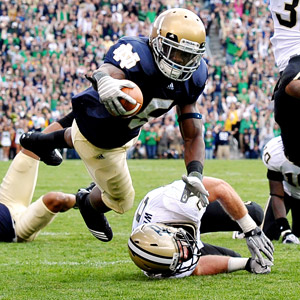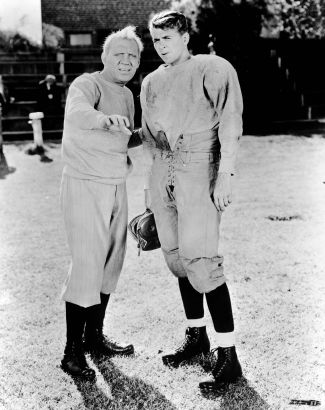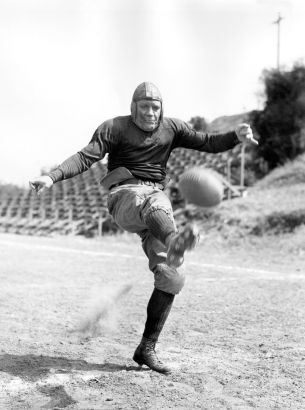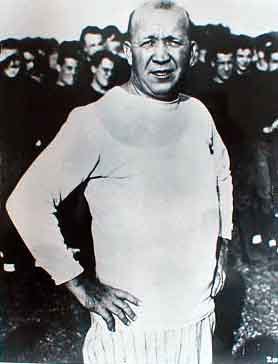Knute Rockne Biography
Born on March 4, 1888 in Voss , Norway , Knute Kenneth Rockne is highly regarded as college football's greatest head coach. To this day, no head coach in the history of the game has had the same success as Rockne.
Rockne's father, a carriage maker, brought the family from Norway to the Logan Square district of Chicago, Ill. when Knute was just five. Rockne first played football on the sandlots of his neighborhood and eventually played end for the Logan Square Tigers. As a teen, he attended North West Division High School in Chicago where he ran track and played football.
After Rockne finished high school, he took a job as a mail dispatcher with the Chicago Post Office for four years. After saving enough money to continue his education, Rockne boarded a train and headed to South Bend , Ind. At the age of 22, Rockne passed the entrance exam and enrolled at Notre Dame.
During Rockne's freshman year he played as a scrub on Notre Dame's varsity football team. Unsatisfied with his football career, he quickly turned his attention to track where he set a school record (12-4) in the indoor pole vault. Rockne's accomplishments on the track ultimately motivated him to give football a second chance, and he was named to Walter Camp's All-America football squad as a third-string end. In 1913 Rockne served as captain of the football team, and along with his roommate, quarterback Gus Dorais, led the Irish to a 35-13 victory over the highly-ranked Army Cadets.
Rockne graduated magna cum laude with a 90.52 (on a scale of 100) grade point average and was offered a job at his alma matter as a graduate assistant in chemistry. He accepted the school's offer under the condition that he would be allowed to help coach the football team. When Jesse Harper, head coach of the Notre Dame Fighting Irish retired in 1917, Rockne was named his successor.
As Notre Dame's head coach from 1918 to 1930, Rockne set the greatest all-time winning percentage of .881. This mark still ranks at the top of the list for both college and professional football. During his 13-year tenure as head coach of the Fighting Irish, Rockne collected 105 victories, 12 losses, five ties and six national championships. He also coached Notre Dame to five undefeated seasons without a tie.
Rockne was known as one of the most innovative and charismatic coaches of his era. He was the first football coach to initiate intersectional rivalries and build a national schedule. He is well known for coaching the most dazzling, dramatic, idolized athlete of all time, George "Gipper" Gipp. Gipp's running, passing, kicking and generalship lifted the Notre Dame Fighting Irish to national fame. Gipp was Notre Dame's first All-American and the famous subject of Rockne's motivating halftime speech in which he coined the phrase, "Win one for the Gipper."
Rockne also coached the "Four Horsemen" - a small but talented Notre Dame backfield that consisted of Harry Stuhldreher, Don Miller, Jim Crowley and Elmer Layden. Together, Rockne and the "Four Horsemen" led Notre Dame to a 28-2 record. Sportswriter Grantland Rice forever cemented the quartet's place in history when he penned the famous homage, "Outlined against a blue-gray October sky, the Four Horseman rode again."
The mark that Rockne left on the game of football is immeasurable. He aided in the development of the forward pass and in doing so helped inrease football's mass appeal. Using his knowledge of the human anatomy, Rockne was keen on designing his own equipment. Understanding the importance that speed plays in the game of football, his designs reduced bulk and weight without sparing protectiveness. He also introduced to the Notre Dame uniform a pair of gold, satin and silk pants that cut down on wind resistance.
Notre Dame won the national championship in 1930, compiling a 10-0 record along the way. During the off season, Rockne was needed in Los Angeles to assist in the production of the film "The Spirit of Notre Dame." After visiting his two sons in Kansas City , Mo. , Rockne boarded Transcontinental-Western's Flight 599 to Los Angeles on March 31, 1931. Shortly after takeoff, one of the plane's wings separated in flight and the aircraft plummeted into a wheat field near Bazaar, Kan. There were no survivors. Rockne was 43 years old.
Born on March 4, 1888 in Voss , Norway , Knute Kenneth Rockne is highly regarded as college football's greatest head coach. To this day, no head coach in the history of the game has had the same success as Rockne.
Rockne's father, a carriage maker, brought the family from Norway to the Logan Square district of Chicago, Ill. when Knute was just five. Rockne first played football on the sandlots of his neighborhood and eventually played end for the Logan Square Tigers. As a teen, he attended North West Division High School in Chicago where he ran track and played football.
After Rockne finished high school, he took a job as a mail dispatcher with the Chicago Post Office for four years. After saving enough money to continue his education, Rockne boarded a train and headed to South Bend , Ind. At the age of 22, Rockne passed the entrance exam and enrolled at Notre Dame.
During Rockne's freshman year he played as a scrub on Notre Dame's varsity football team. Unsatisfied with his football career, he quickly turned his attention to track where he set a school record (12-4) in the indoor pole vault. Rockne's accomplishments on the track ultimately motivated him to give football a second chance, and he was named to Walter Camp's All-America football squad as a third-string end. In 1913 Rockne served as captain of the football team, and along with his roommate, quarterback Gus Dorais, led the Irish to a 35-13 victory over the highly-ranked Army Cadets.
Rockne graduated magna cum laude with a 90.52 (on a scale of 100) grade point average and was offered a job at his alma matter as a graduate assistant in chemistry. He accepted the school's offer under the condition that he would be allowed to help coach the football team. When Jesse Harper, head coach of the Notre Dame Fighting Irish retired in 1917, Rockne was named his successor.
As Notre Dame's head coach from 1918 to 1930, Rockne set the greatest all-time winning percentage of .881. This mark still ranks at the top of the list for both college and professional football. During his 13-year tenure as head coach of the Fighting Irish, Rockne collected 105 victories, 12 losses, five ties and six national championships. He also coached Notre Dame to five undefeated seasons without a tie.
Rockne was known as one of the most innovative and charismatic coaches of his era. He was the first football coach to initiate intersectional rivalries and build a national schedule. He is well known for coaching the most dazzling, dramatic, idolized athlete of all time, George "Gipper" Gipp. Gipp's running, passing, kicking and generalship lifted the Notre Dame Fighting Irish to national fame. Gipp was Notre Dame's first All-American and the famous subject of Rockne's motivating halftime speech in which he coined the phrase, "Win one for the Gipper."
Rockne also coached the "Four Horsemen" - a small but talented Notre Dame backfield that consisted of Harry Stuhldreher, Don Miller, Jim Crowley and Elmer Layden. Together, Rockne and the "Four Horsemen" led Notre Dame to a 28-2 record. Sportswriter Grantland Rice forever cemented the quartet's place in history when he penned the famous homage, "Outlined against a blue-gray October sky, the Four Horseman rode again."
The mark that Rockne left on the game of football is immeasurable. He aided in the development of the forward pass and in doing so helped inrease football's mass appeal. Using his knowledge of the human anatomy, Rockne was keen on designing his own equipment. Understanding the importance that speed plays in the game of football, his designs reduced bulk and weight without sparing protectiveness. He also introduced to the Notre Dame uniform a pair of gold, satin and silk pants that cut down on wind resistance.
Notre Dame won the national championship in 1930, compiling a 10-0 record along the way. During the off season, Rockne was needed in Los Angeles to assist in the production of the film "The Spirit of Notre Dame." After visiting his two sons in Kansas City , Mo. , Rockne boarded Transcontinental-Western's Flight 599 to Los Angeles on March 31, 1931. Shortly after takeoff, one of the plane's wings separated in flight and the aircraft plummeted into a wheat field near Bazaar, Kan. There were no survivors. Rockne was 43 years old.
Knute Rockne
Knute Rockne
Knute Rockne
Knute Rockne
Knute Rockne
Knute Rockne
Knute Rockne
Knute Rockne
Knute Rockne All American -Trailer (1940) Football
Knute Rockne Documentary







No comments:
Post a Comment